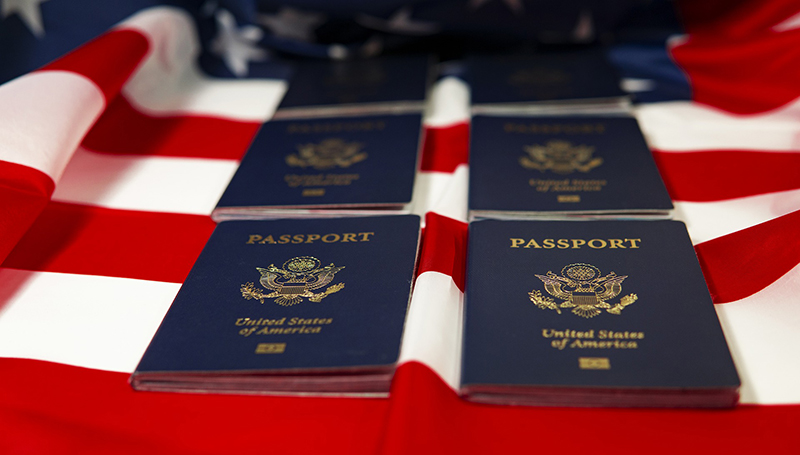People often ask us what to expect in a naturalization interview to become a U.S. citizen. It’s an exciting time and at our firm we celebrate every single one of our clients who choose to become a U.S. citizen. We know that for many, it has been a long journey to this point.
Here are a few things to remember about the naturalization interview process.
1. First, you must determine whether you may already be a US citizen.
Some individuals acquire citizenship at birth or derive citizenship through their parents. If your parents are US citizens, it is important that you speak to an immigration attorney before submitting your naturalization application (Form N-400). If USCIS determines that you are in fact a US citizen, your naturalization application will be denied.
2. You will have to get 6/10 questions correct on the oral civic exam and read and write one sentence in English unless you qualify for an exemption.
If you answer the 1st six questions correctly, the officer will stop there and move on to the reading and writing portion of the exam. You will have to read and write one simple sentence in English.
Some people may qualify for an exemption and take the exam in their native language. It depends on your age and for how long you have been a permanent resident. Some people may also qualify for a medical waiver.
3. When you naturalize, you can change your name to anything you want (first and/or last name).
There is a question on the N-400 that asks whether you want a name change. This is the easiest way to request a legal name change. If you request a name change, at the oath ceremony you will be sworn in by a federal judge, instead of an immigration officer.
4. If you have ever been arrested, you will need to provide certified copies of the arrest record and court documents. You also should disclose all citations.
Many clients do not take this part of the application process seriously enough. All arrests should be reported, regardless of whether charges were dismissed, or your file was expunged or sealed. It also doesn’t matter how long ago the arrest occurred. In addition, the question on the N-400 asks about all citations as well. This means traffic citations, including speeding, or other minor infractions. Citations are not normally an issue but the question on the application is specific. It also includes any time you may have been detained by an immigration official. You must also disclose all arrests or citations even if they were already disclosed in previous immigration applications. If you fail to disclose arrests, your application may be denied for misrepresentation to an immigration official.
It is important to note that some arrests will impact your eligibility to apply for naturalization and could lead to immigration initiating deportation proceedings against you. If you have had arrests, regardless of how long ago, you should speak to an immigration attorney.
5. If you were ever in immigration court, make sure proceedings against you have been terminated.
If your immigration proceedings were administratively closed, not terminated, you will have to request that your case be calendared and terminated before you can file for naturalization.
6. If you have voted in a federal election, or registered to vote, your application may be denied, and you may be placed into deportation proceedings.
Some individuals were automatically registered to vote when they applied for a driver’s license at the DMV. If you are unsure if you have registered to vote, contact your Supervisor of Elections.
7. If you ever told someone you were a U.S. citizen or stated on a form that you were a U.S. citizen (maybe to work or for some other reason), you may be ineligible for naturalization.
Even worse, you may be placed into deportation proceedings as this is a deportable offense.
8. If you are married, or have been divorced, take the original or certified copy of the marriage certificate, or final order of divorce.
Providing copies of these documents should be included with your original filing. However, some officers want to compare the original to the copy and request to see these documents. Your civil status will be listed on your naturalization certificate.
Be careful if your permanent residence was based on marriage and you were not legally divorced before you remarried. This could result is serious problems with your immigration status.
9. The immigration service can ask for the last 5 years of your tax returns.
There is a question on the N-400 that asks if you have filed U.S. taxes since you became a permanent resident. If you have not, an officer can find that you do not have the requisite Good Moral Character and deny your application. If you have not filed taxes, you will need to provide a valid reason as to why you did not. Also, if you are paying overdue taxes, you are required to disclose this information.
10. Even if you pass your exam, you are not a U.S. citizen until you take the Oath of Allegiance and receive your Certificate of Naturalization.
This means that until you take the oath and receive your Certificate of Naturalization, you cannot register to vote or apply for a U.S. passport or hold yourself out to others as a U.S. citizen. Do not skip this step of the process. The oath is the most important part of the process, and the easiest!
If you have any questions about the N-400 application, or concerns about your eligibility, please call our office for an appointment. We can help! We enjoy guiding clients through the naturalization process because we know how much it means to clients to become a U.S. citizen after their (often long) immigration journey.

